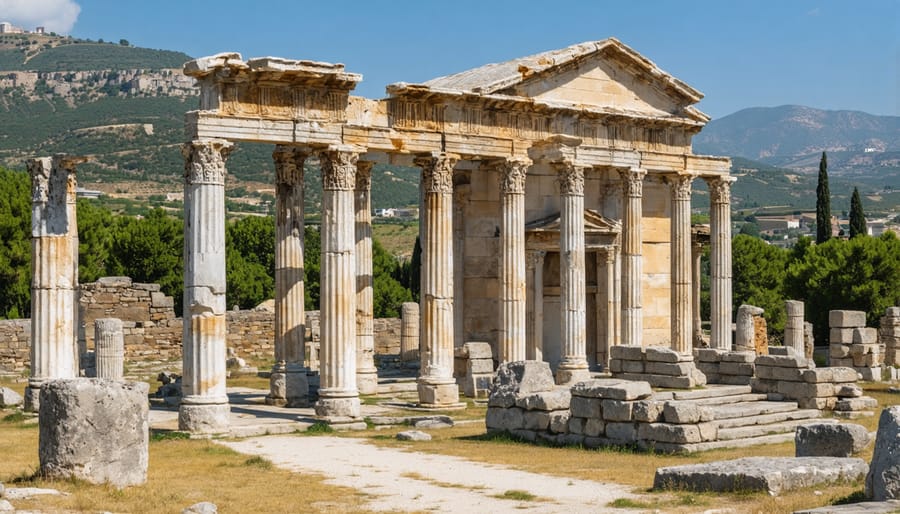Journey into the heart of Christ’s personal messages to His early church through Revelations chapters 2 and 3, where seven powerful letters reveal timeless truths that echo through generations of faithful believers. These divine communications, while rooted in first-century Asia Minor, offer profound insights for modern Christians seeking to strengthen their relationship with God and navigate contemporary spiritual challenges. Understanding Revelation’s context opens a window into Christ’s careful assessment of each congregation’s strengths, struggles, and spiritual condition – from the perseverance of Smyrna to the lukewarm faith of Laodicea. Through these letters, Jesus provides both stern warnings and tender encouragements, painting a vivid picture of what authentic Christian community should look like. Whether you’re a seasoned believer or new to biblical study, these chapters serve as a divine diagnostic tool for examining our own spiritual health and the vitality of our church communities today.
The Letters to Ephesus and Smyrna: Love and Persecution

Ephesus: Rekindling First Love
The church of Ephesus, as revealed through archaeological discoveries in Ephesus, was a thriving center of early Christianity. While Christ commends this church for its perseverance, discernment, and hard work, He identifies a critical issue: they had abandoned their first love. This powerful message resonates deeply with many believers today who find themselves going through the motions of faith without the passionate devotion they once had.
The “first love” refers to that initial, fervent love for Christ that characterizes new believers – a love marked by enthusiasm, joy, and wholehearted dedication. Just as a married couple must nurture their relationship beyond the wedding day, our relationship with Christ requires intentional cultivation.
The solution Christ offers is threefold: remember, repent, and return. Remember the height from which you have fallen – recall those moments of intimate fellowship with God. Repent – acknowledge the drift in your heart and turn back to Him. Return to those first works – recapture the devotional practices and loving service that marked your early walk with Christ.
This message carries both a warning and hope: while the consequences of neglecting our first love are serious, the path to restoration is always open through genuine repentance.
Smyrna: Faith Through Suffering
The church in Smyrna faced intense persecution and poverty, yet Jesus addressed them with words of profound encouragement. Despite their material poverty, Christ declared them spiritually rich, acknowledging their unwavering faith amid severe trials. The congregation endured opposition from those who claimed to be Jews but were actually serving Satan’s purposes through their persecution of believers.
Jesus’ message to Smyrna contained no rebuke, only comfort and strength for the difficult path ahead. He warned them of coming imprisonment and tribulation lasting ten days, symbolizing a defined period of intense testing. Rather than promising earthly relief, Christ called them to remain faithful even to the point of death, assuring them of the crown of life as their eternal reward.
This message resonates deeply with believers facing persecution today. Just as the Smyrnan church demonstrated, true wealth isn’t measured in earthly possessions but in spiritual riches. Their example teaches us that suffering for Christ, while painful, is temporary and purposeful. The promise that those who overcome will not be hurt by the second death offers eternal perspective and hope, reminding us that our present trials pale in comparison to the glory that awaits faithful believers.

Pergamum and Thyatira: Truth Versus Compromise
Pergamum: Standing Firm in Truth
Pergamum, situated in a city known for its pagan worship and imperial cult, faced intense pressure to compromise their faith. Christ commends this church for holding fast to His name even in Satan’s territory, particularly during the martyrdom of faithful Antipas. However, the Lord also addresses serious concerns about their tolerance of false teachings, specifically the doctrines of Balaam and the Nicolaitans.
The challenge of protecting Biblical truth while living in a worldly environment remains relevant today. Like Pergamum, modern believers often face pressure to accommodate cultural practices that contradict Christian values. The church’s struggle with the teachings of Balaam – which promoted compromise with pagan practices and moral permissiveness – mirrors contemporary challenges of maintaining spiritual integrity in a secular world.
Christ’s solution is clear: repent and hold firmly to sound doctrine. His promise to the overcomer includes hidden manna and a white stone with a new name, symbolizing intimate fellowship with Him and a transformed identity. This message reminds us that staying true to God’s Word, despite societal pressure, leads to spiritual nourishment and eternal rewards.
Thyatira: Confronting False Tolerance
In the letter to Thyatira, Jesus both commends the church for its growing love and service while addressing a serious concern: their tolerance of false teaching, symbolized by “Jezebel.” This self-proclaimed prophetess was leading believers astray through immoral practices and false doctrines, much like the historical Queen Jezebel who promoted idol worship in ancient Israel.
The Lord’s message here serves as a powerful reminder that love and tolerance, while important Christian virtues, must be balanced with unwavering commitment to biblical truth. The church was flourishing in many ways, yet their permissive attitude toward false teaching threatened to undermine their spiritual health.
Jesus promises severe consequences for those who persist in following false teachings but offers hope and encouragement to those who “hold fast” to the truth. His words, “I will give authority over the nations,” remind faithful believers of their future reward and responsibility.
For today’s churches, this message emphasizes the importance of maintaining sound doctrine while practicing discernment. It challenges us to examine whether we might be compromising biblical truth in the name of acceptance or unity. True Christian love doesn’t mean accepting everything but rather standing firm in truth while showing Christ’s compassion.
Sardis, Philadelphia, and Laodicea: Spiritual Condition and Promise
Sardis: Awakening from Spiritual Death
The message to the church in Sardis stands as one of the most sobering warnings in Revelation. Jesus addresses a congregation that had a reputation for being alive, yet He declares them spiritually dead. This stark contrast between appearance and reality serves as a powerful wake-up call for churches and believers today.
“I know your works, that you have a name that you are alive, but you are dead” (Revelation 3:1). These words cut through the façade of religious activity to expose the heart of the matter. Like many churches today, Sardis may have had impressive programs, regular gatherings, and a good reputation in the community, but their spiritual vitality had vanished.
The Lord’s counsel to this church is both urgent and merciful: “Be watchful, and strengthen the things which remain, that are ready to die” (Revelation 3:2). This call to vigilance reminds us that spiritual death often comes gradually, through neglect rather than sudden catastrophe. Jesus identifies specific steps for revival: remember what you received, hold fast, and repent.
Encouragingly, even in this spiritually lifeless congregation, there were “a few names even in Sardis who have not defiled their garments” (Revelation 3:4). These faithful believers serve as a reminder that God always preserves a remnant of genuine followers, even in the most challenging circumstances.
The promise to overcomers in Sardis is particularly meaningful: they will be clothed in white garments, and their names will remain in the Book of Life. This imagery of pure, white clothing represents the righteousness of Christ and the victory of those who maintain their faith despite surrounding spiritual decay.
For contemporary believers, the message to Sardis calls us to examine whether our Christian life is merely a form of godliness without power. It challenges us to move beyond superficial religion to authentic relationship with Christ, ensuring our spiritual vitality matches our outward profession of faith.
Philadelphia: The Faithful Church
The church of Philadelphia stands out as one of only two churches in Revelation that receive no rebuke from Christ, earning pure commendation for their faithfulness. Despite having “little strength,” this congregation remained steadfast in keeping God’s word and not denying His name. Their unwavering dedication in the face of opposition serves as an inspiring example for believers today.
Jesus addresses this church with profound tenderness, presenting Himself as “He who is holy and true, who holds the key of David.” This description emphasizes His authority and trustworthiness, offering comfort to a congregation facing persecution from those who falsely claimed to be God’s people.
The Lord makes several magnificent promises to this faithful church. He pledges to open doors that no one can shut, suggesting divine opportunities for ministry and spiritual growth. This promise reminds us that when God creates opportunities for His people, no earthly power can stand in the way.
Perhaps most remarkably, Christ promises to protect this church from “the hour of trial that is going to come on the whole world.” This assurance of divine protection demonstrates God’s faithfulness to those who remain loyal to Him, even in challenging circumstances.
The rewards promised to the overcomers in Philadelphia are particularly beautiful: they will be made pillars in God’s temple, never to leave it again. This imagery suggests permanent stability and honor in God’s presence. Additionally, they will receive three names: the name of God, the name of the New Jerusalem, and Christ’s new name, symbolizing complete identification with and belonging to God.
For modern believers, Philadelphia’s message offers tremendous encouragement. It teaches us that spiritual strength isn’t measured by numbers or resources but by faithfulness to God’s word and unwavering commitment to His name. This church reminds us that patient endurance and maintaining our testimony, even with limited strength, pleases the Lord and leads to eternal rewards.

Laodicea: Overcoming Lukewarmness
The message to the church in Laodicea stands as perhaps the most sobering of all seven letters, addressing a spiritual condition that many modern Christians find uncomfortably familiar. Located in a wealthy commercial center known for its banking, textile industry, and medical school, Laodicea had become prosperous and self-sufficient – yet in Jesus’s eyes, they were “wretched, pitiful, poor, blind and naked” (Revelation 3:17).
The Lord’s criticism of their lukewarm faith – neither hot nor cold – points to a deeper spiritual crisis. Just as Laodicea received its water through aqueducts, arriving tepid and unpalatable, their faith had become similarly distasteful to God. Their comfortable existence had led to spiritual complacency, believing they “needed nothing” while being blind to their true spiritual poverty.
Christ’s remedy for their condition comes with both rebuke and invitation. He counsels them to “buy from me gold refined in the fire,” representing genuine faith tested by trials; “white clothes to wear,” symbolizing Christ’s righteousness; and “salve to put on your eyes,” referring to spiritual discernment (Revelation 3:18). This prescription directly addressed their pride in their financial wealth, famous black wool, and renowned eye medicine.
The most touching aspect of this letter is found in verse 20, where Jesus says, “Here I am! I stand at the door and knock.” This intimate invitation shows that despite their lukewarm state, Christ still desires fellowship with His people. He offers the opportunity for renewal and intimate communion with Him.
For today’s believers, this message serves as a wake-up call to examine our own spiritual temperature. In our age of comfort and material abundance, we must guard against allowing our faith to become passive or merely cultural. Christ calls us to passionate, authentic relationship with Him, where our love and devotion are evident in our actions and choices.
The messages to the seven churches in Revelation 2 and 3 continue to resonate powerfully with believers and congregations today. These divine letters serve as timeless mirrors, reflecting both our strengths and areas needing growth in our spiritual journey. Just as each church faced unique challenges and received specific encouragement, modern Christians and faith communities can find themselves reflected in these ancient words.
The recurring themes – staying faithful amid persecution, maintaining doctrinal purity, avoiding spiritual complacency, and keeping our first love for Christ – remain remarkably relevant. Today’s churches face similar challenges: the pressure to compromise biblical truth, the temptation of materialism, and the struggle to maintain spiritual fervor in an increasingly secular world.
Christ’s words to these churches remind us that He intimately knows each congregation’s situation, celebrating their victories and lovingly calling attention to areas requiring repentance. The promises given to “those who overcome” offer hope and encouragement for our own spiritual battles.
As we reflect on these messages, we’re called to examine our own hearts and communities honestly. Are we maintaining our passionate love for Christ? Are we standing firm in truth while showing His love? Are we remaining vigilant against false teaching and moral compromise? These letters challenge us to live authentically for Christ, reminding us that He walks among His churches today just as He did in the first century.
